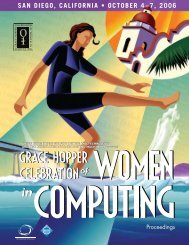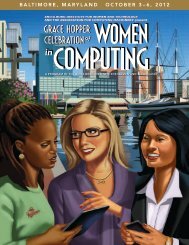ABI-ONE ghc program v14.indd - Grace Hopper Celebration of ...
ABI-ONE ghc program v14.indd - Grace Hopper Celebration of ...
ABI-ONE ghc program v14.indd - Grace Hopper Celebration of ...
Create successful ePaper yourself
Turn your PDF publications into a flip-book with our unique Google optimized e-Paper software.
A Survey <strong>of</strong> Penetration Testing Against<br />
Web Application Vulnerabilities<br />
Presenter: Jing (Wendy) Jin (George<br />
Mason University)<br />
Web application vulnerabilities such<br />
as Cross-site Scripting, SQL injection<br />
become serious security problems in<br />
financial and health systems. These vulnerabilities<br />
allow attackers to perform various<br />
actions like obtaining unauthorized account<br />
access, stealing users’ sensitive data etc.<br />
We describe state <strong>of</strong> art <strong>of</strong> web application<br />
penetration testing which mimics attackers’<br />
behaviors. Based on our vulnerable Bank<br />
demo, we analyze the effectiveness <strong>of</strong><br />
multiple penetration testing tools against<br />
several well-known attacks.<br />
A Technique to Achieve Higher<br />
Utilization Bound for Static-Priority<br />
Tasks on Multiprocessors<br />
Presenter: Molood Noori Alavijeh<br />
(Chalmers University <strong>of</strong> Technology)<br />
This paper proposes a technique to<br />
develop a scheduling algorithm for<br />
real-time periodic tasks on multiprocessors.<br />
A new technique is used for task assignment<br />
to processors. The feasibility analysis for<br />
the worst case performance is addressed.<br />
The objective is to prove that, all tasks meet<br />
their deadlines, if the utilization <strong>of</strong> a task set<br />
is less than or equal to UB percentage <strong>of</strong> the<br />
total processing capacity <strong>of</strong> m processors.<br />
An Exploration <strong>of</strong> Intuitive Travel<br />
Techniques for Full Body Video Game<br />
Interfaces<br />
Presenter: Juliet N.P. Norton (University <strong>of</strong><br />
Central Florida)<br />
We present work based on a Wizard-<strong>of</strong>-<br />
Oz study exploring travel interaction<br />
techniques for full body interfaces in the<br />
video game Mirror’s Edge. Given complete<br />
freedom in choosing motions and gestures,<br />
participants showed a mix <strong>of</strong> natural and<br />
constrained gestures adapted to space and<br />
field <strong>of</strong> view restrictions. We discuss our<br />
SRC POSTER SESSION<br />
W e d n e s d ay | s e p T 3 0<br />
results, provide design guidelines for full<br />
body interfaces, and present our current<br />
work the implementation <strong>of</strong> our proposed<br />
gesture set.<br />
Authorship Attribution <strong>of</strong> Web Forum<br />
Posts using Clustering and Specialized<br />
Classifiers<br />
Presenter: Sangita Pillay (University <strong>of</strong><br />
Alabama at Birmingham)<br />
Internet communication tools serve as an<br />
effective platform for suspicious activities<br />
among anonymous users. Our current<br />
research work focuses on combining supervised<br />
and unsupervised learning approaches<br />
for performing authorship attribution on web<br />
forum posts. For the first stage our approach<br />
focuses on using clustering techniques to<br />
reduce the complexity <strong>of</strong> processing a large<br />
number <strong>of</strong> posts and authors. The second<br />
stage involves using the resulting clusters to<br />
train specialized classifiers.<br />
Automated Event Extraction and Named<br />
Entity Recognition in the Domain <strong>of</strong><br />
Veterinary Medicine<br />
Presenter: Svitlana Volkova (Johns<br />
Hopkins University)<br />
We present an approach for automated<br />
extraction <strong>of</strong> animal disease-related<br />
events from unstructured web documents.<br />
Our approach relies on extraction <strong>of</strong><br />
structured entity tuples consisting <strong>of</strong> event<br />
attributes such as: animal diseases, dates,<br />
species, locations and confirmation status<br />
<strong>of</strong> the event. Moreover, for domain-specific<br />
entity extraction we automatically build an<br />
ontology using syntactic pattern matching<br />
approach for semantic relation discovery<br />
between disease entities (precision - 0.84,<br />
recall - 0.78).<br />
Coexpression Predicate Extraction from<br />
Text using Conditional Random Fields<br />
Presenter: Richa Tiwari (University <strong>of</strong><br />
Alabama at Birmingham)<br />
We present a framework for extracting<br />
information about coexpression<br />
relationship among genes from text using<br />
Conditional Random Fields. The classification<br />
results <strong>of</strong> our CRFs model, trained on<br />
full-length biomedical papers, have been<br />
compared with that <strong>of</strong> Support Vector<br />
Machine, Nearest Neighbor with generalization<br />
and Neural Networks. We also evaluate<br />
our ranking results against the search<br />
results <strong>of</strong> Google and PubMed and show the<br />
improvement in distinguishing positive and<br />
negative papers.<br />
Compound Merging Strategies for<br />
Statistical Machine Translation<br />
Presenter: Sara Stymne (Linköping<br />
University)<br />
Translation into compounding languages<br />
like German and Swedish is a challenge<br />
for statistical machine translation. I present<br />
a novel algorithm for merging compound<br />
parts, based on part-<strong>of</strong>-speech matching<br />
with an extended tag set. It improves the<br />
quality <strong>of</strong> merged compounds compared<br />
to previously suggested methods, both<br />
measured automatically and shown in an<br />
error analysis. Translation is also improved<br />
compared to systems without compound<br />
processing for Swedish and German.<br />
Deterministic, Deadlock-Free<br />
Concurrency<br />
Presenter: Nalini Vasudevan (Columbia<br />
University)<br />
Most concurrent <strong>program</strong>ming models<br />
come with two major pitfalls: nondeterminism<br />
and deadlocks. By determinism,<br />
we mean the output behavior <strong>of</strong> the <strong>program</strong><br />
is independent <strong>of</strong> the scheduling choices<br />
(e.g., the operating system) and depends<br />
only on the input behavior.<br />
Anita Borg Institute for Women and Technology | <strong>Grace</strong> <strong>Hopper</strong> <strong>Celebration</strong> <strong>of</strong> Women in Computing 43




